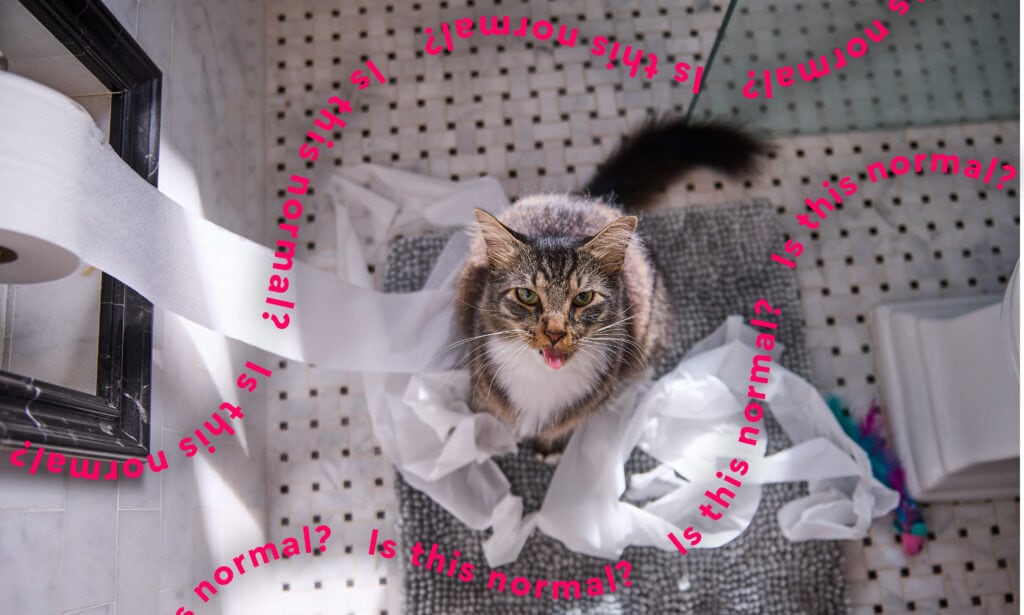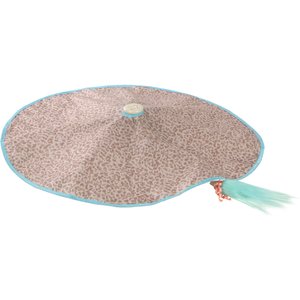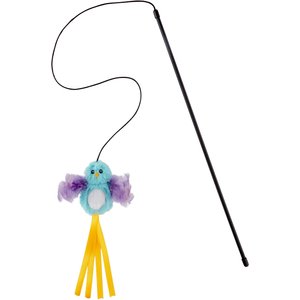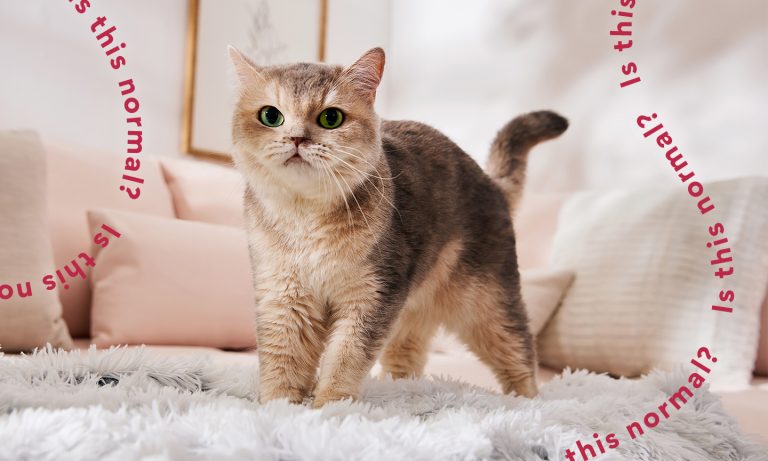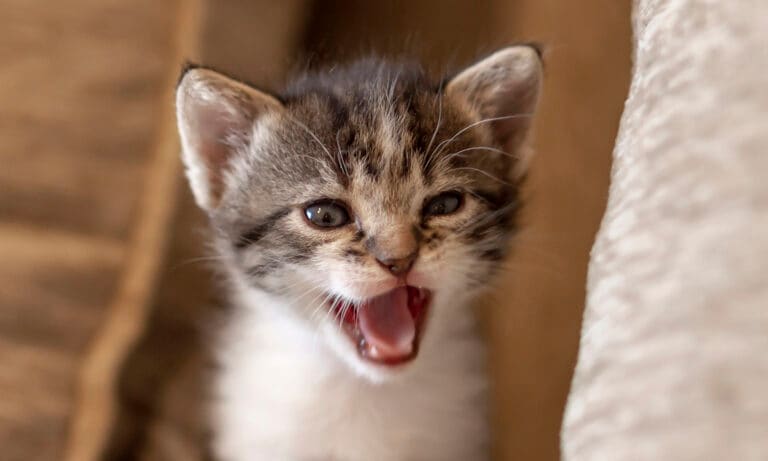Q:My cat joins me every time I go to use the restroom or shower and seems set on watching my every move. Why does my cat follow me to the bathroom? Is this normal?
A: Yes! Although a bit strange to us, following you to the bathroom is completely normal behavior for cats. While the reasons can vary, cats tend to follow their pet parents to the bathroom out of curiosity, their love for them, or when they’re seeking comfort.
We spoke to a certified cat behaviorist and a vet expert to explain why cats follow their pet parents to the bathroom.
In This Guide:
Why Do Cats Follow You to the Bathroom? 4 Reasons
Chewy
“The internet is full of wild theories, like cats being secret guardians of bathroom rituals,” says Mieshelle Nagelschneider, cat behaviorist and owner of The Cat Behavior Clinic in Seattle. “I believe the answer is much simpler and rooted in feline instincts and psychology, as with most cat behaviors.”
So, why do cats follow you into the bathroom? Here are a few reasons:
1. They Love Us and Want To Interact
Consider that cats are social and drawn to predictability. So, sitting in one place for a while—whether on the toilet, working at a desk, doing yoga on the floor, or lounging in bed—creates predictable and opportune times for them to have social interactions with you, says Nagelschneider.
“Cats often feel most comfortable approaching us during these moments, because we’re stationary and not moving,” she explains.
Nagelschneider adds that “from an evolutionary standpoint, a sitting or lying-down posture can signal to another cat that you’re open to interaction—no sudden moves, no threat.”
And because your bathroom trips tend to follow a regular schedule, this makes them prime bonding opportunities for a cat seeking comfort or connection, she says.
What’s more, this is a time when your kitty knows they can soak up undivided attention from their preferred captive audience, says Maggie Placer, DVM, veterinary science program manager at EveryCat Health Foundation and owner of Placer Veterinary Care in Lafayette, Louisiana.
Cats may engage in this behavior more during times of grief.
2. They’re Curious
“The natural enemy of cats is closed doors,” Dr. Placer says. “They are there for it all: smells, toilet paper, possibly contents of a trash can.”
If your cat is as curious as Leonardo da Vinci, kitty-proof your bathroom by:
- Placing lids on trash cans
- Storing potentially harmful household items like toothpaste, medications, or cleaners in cabinets
- Keeping the toilet lid down to keep them safe
3. They’re Anticipating Mealtime—and Soon
With some of the intense stares we get from our felines at all hours of the day, it may come as no surprise that they’re able to quickly pick up on our routines.
If your cat learns feeding time is sometime after the bathroom visit, Nagelschneider says they’ll often keep a close eye on us as they wait to feast.
“I also think that if we were sitting in a chair in the bathroom instead of a toilet, you’d see the same behavior from your cat,” she adds. “It’s definitely not because it’s a toilet.”
Creatures of habit with a great internal clock, cats enjoy reliability, says Dr. Placer.
“It’s reassuring,” she explains. “If a feeding follows your morning movement or they get let outside, it becomes a form of positive reinforcement for joining you while you do your business.”
As a result, any kind of attention you give your cat inadvertently teaches them that the bathroom is the place to get it and encourages this behavior.
4. They Like the Amenities
A cool surface in the summer or a heated floor in the winter can be appealing to kitties, Dr. Placer says. Cats with joint or muscle pain may especially seek out warm surfaces.
Additionally, they may feel safer in a smaller area during stressful moments, like during a storm.
Regardless of the reason, Nagelschneider considers this to be completely normal behavior.
“It’s so common among cats that it’s safe to say it’s just part of their evolved ‘survival of the instinct’ traits,” she says. “Research shows that cats form strong attachments to their humans, similar to the bond with dogs and even infants.”
Joining you to the bathroom or other enclosed spaces helps create predictable moments and feelings of safety. This behavior, Nagelschneider says, aligns with findings that cats interpret human habits as part of their environment and social structure.
In certain cases, such as if your kitty suddenly starts—or stops, affectionately—accompanying you to the restroom, Dr. Placer says to consider what else may be going on.
Separation anxiety is an abnormal cause for this behavior, she says. Although, if your cat is showing signs of separation anxiety, it’s always a good idea to consult your vet to determine whether it is medical or behavior related.
What Should I Do If I Don't Want My Cat Following Me?
Is your cat relentlessly unrolling your toilet paper? Jumping in the bathtub or shower? Sometimes, cats revel in causing their own kind of chaos wherever possible—even while you’re trying to go to the bathroom in peace.
Our experts share these tips on what to do if you don’t want your cat following you to the bathroom, and how to prevent unwanted behavior:
1. Give them a replacement behavior to focus their attention elsewhere before you go to the bathroom.
To prevent stress and enrich your kitty’s life, Dr. Placer and Nagelschneider say to redirect their attention with a treat, toy, food puzzle, or another activity in another room.
One of Nagelschneider’s favorite cat toys that activates their “seeking circuit” is the SmartyKat Instincts electronic motion cat toy.
2. Find a predictable time and place that you can spend time with your cat.
Having your cat watch you intently while you do your thing in the restroom can be a bit awkward, to say the least.
Nagelschneider says you can instead create another predictable moment for your cat to socialize and bond with you.
This could be sitting with you as you drink your cup of coffee in the morning, their feeding time, a grooming session, or playtime.
3. Feed them as much or as frequently as they prefer.
Nagelschneider has also seen this behavior if a cat isn’t fed as much or as frequently to satiate their appetite.
“Interestingly, we are seeing more of these types of extra needy/clingy cases with the newer timed auto-feeders that dispense a measured amount of cat food,” she says.
FAQs About Cats and Bathrooms
Q:Why does my cat accompany me when I use the restroom?
A:Cats are comfortable approaching us while we’re stationary, as they interpret this lack of movement as an open invitation to socialize and interact with us.
Q:Why does my cat watch me shower?
A:
According to Nagelschneider, a cat may watch you shower because it’s a way for them to spend time with you, they’re drawn to running water, and/or they like the warmth of a steamy hot shower.
“Cats are curious and thrive in enriching environments, and watching us in the shower provides them with an entertaining experience!” she says.
This content was medically reviewed by a veterinarian.
More about your cat's behavior:
Share:
